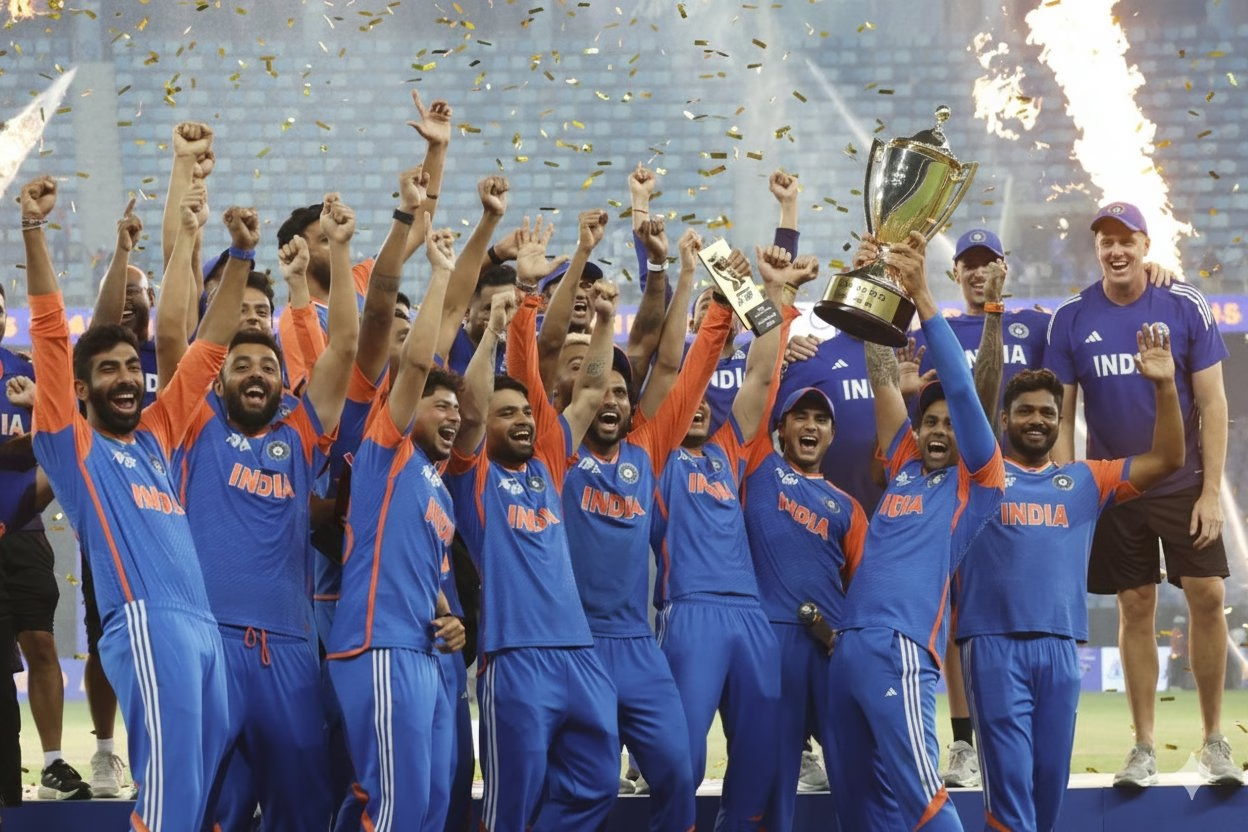The 2025 Asia Cup ended in Dubai with India defeating Pakistan in a fiery final that stretched beyond the cricket pitch into the realm of politics and pride. Instead of the traditional moment where champions lift the trophy, the spectacle turned sour when India captain Suryakumar Yadav and his players refused to accept the award.
Suryakumar Yadav And His Stance
Suryakumar Yadav, standing at the heart of the storm, explained his decision in clear words after guiding his team to a five-wicket win over Pakistan.
“I think this is one thing which I have never seen since I started playing cricket, that the champion team is denied the trophy,”
he said.
The Indian captain confirmed that the decision was taken collectively on the field. Instead of lifting the official silverware, his players celebrated by pretending to hold an invisible trophy high into the Dubai night. For Yadav, the moment was about his teammates, not the prize.
“If you tell me about the trophies, my trophies are sitting in my dressing room — all the 14 players and support staff. They are the real trophies for me,”
he added.
The absence of the traditional trophy handover was made official when the post-match presentation ceremony, already delayed by an hour, concluded with the announcer declaring that India would not be collecting their awards.
Salman Agha Accuses India Of Disrespect
Pakistan’s captain Salman Agha did not hold back in his criticism of India’s conduct across the tournament.
“I think what has happened in this tournament is very disappointing,”
Agha told reporters.
He accused the Indian players of showing disregard not only towards Pakistan but towards the spirit of cricket itself.
“If they think they disrespected us by not shaking hands, then I say they disrespected cricket. What they did today, a good team doesn’t do that. Good teams do what we have done. We waited for our medals and took them,”
he said.
The refusal to exchange handshakes after matches between the two sides became a recurring feature of this Asia Cup, further deepening the divide. For Agha, the sight of India walking away from the official prize was another damaging blow to the image of the sport.
The Final Match And Its Flashpoints
On the field, India claimed their third straight win over Pakistan in this edition of the Asia Cup. Pace spearhead Jasprit Bumrah sealed the victory by bowling Haris Rauf for six runs. His celebration drew attention when he made a crashing-plane gesture. The action was a direct response to Rauf, who had made a similar gesture in the previous encounter between the sides, seemingly mocking India’s military operations.
Such gestures were not isolated. Pakistan opener Sahibzada Farhan had earlier mimicked firing a gun after scoring a half-century, a move that sparked heated reactions from Indian players and supporters alike. These moments symbolised how the rivalry has stretched far beyond bat and ball.
Politics Looms Over The Tournament
This year’s Asia Cup marked the first time India and Pakistan faced each other since the short yet bloody military conflict in May. More than 70 people lost their lives in the clashes, which included missile strikes, drone attacks, and heavy exchanges of fire.
India named its offensive “Operation Sindoor,” drawing on a Hindu cultural symbol associated with marital bonds and widows. For many, it was seen as an act of symbolism, aimed at avenging the women who had lost their husbands in the Kashmir attack on April 22.
The political baggage carried into the tournament and was evident in almost every meeting between the two cricketing giants. Players on both sides reflected this tension through symbolic gestures that went far beyond sport.
The Trophy Snub And Its Aftermath
The refusal to accept the trophy placed the Asian Cricket Council in an awkward spotlight. Mohsin Naqvi, president of the ACC, chairman of the Pakistan Cricket Board, and Pakistan’s interior minister, had been tasked with presenting the trophy. With India rejecting the honour, the moment became a global talking point.
Suryakumar’s team celebrated without silverware, while images of the players holding an imaginary cup dominated social media. The choice to forgo the official prize was as symbolic as any celebration or gesture during the tournament, cementing the rivalry’s shift from the pitch to the political stage.
Leaders Add Fuel To The Fire
India’s Prime Minister Narendra Modi could not resist drawing parallels between the cricket field and the military.
“#OperationSindoor on the games field. Outcome is the same — India wins! Congrats to our cricketers,”
he wrote on X, fuelling nationalist pride among Indian fans.
In swift response, Mohsin Naqvi countered with a sharp rebuke aimed at India’s history of military encounters with Pakistan.
“If war was your measure of pride, history already records your humiliating defeats at Pakistan’s hands,”
he said.
The exchange underscored how cricket between India and Pakistan is no longer just about runs and wickets. It has become an extension of national identity, political rivalry, and cultural pride.
The Asia Cup 2025 may have crowned India as champions on the scoreboard, but the tournament will be remembered for much more than cricket. The absence of a handshake, the refusal of a trophy, and the echoes of war rhetoric ensured that Dubai hosted not just a cricket final, but a reminder of one of the world’s fiercest rivalries.

















